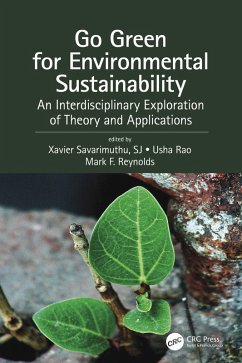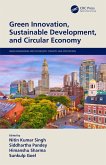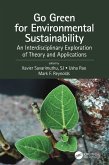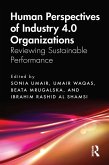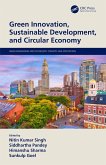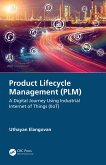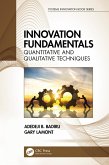Go Green for Environmental Sustainability (eBook, ePUB)
An Interdisciplinary Exploration of Theory and Applications
Redaktion: Savarimuthu Sj, Xavier; Reynolds, Mark F.; Rao, Usha
51,95 €
51,95 €
inkl. MwSt.
Sofort per Download lieferbar

26 °P sammeln
51,95 €
Als Download kaufen

51,95 €
inkl. MwSt.
Sofort per Download lieferbar

26 °P sammeln
Jetzt verschenken
Alle Infos zum eBook verschenken
51,95 €
inkl. MwSt.
Sofort per Download lieferbar
Alle Infos zum eBook verschenken

26 °P sammeln
Go Green for Environmental Sustainability (eBook, ePUB)
An Interdisciplinary Exploration of Theory and Applications
Redaktion: Savarimuthu Sj, Xavier; Reynolds, Mark F.; Rao, Usha
- Format: ePub
- Merkliste
- Auf die Merkliste
- Bewerten Bewerten
- Teilen
- Produkt teilen
- Produkterinnerung
- Produkterinnerung

Bitte loggen Sie sich zunächst in Ihr Kundenkonto ein oder registrieren Sie sich bei
bücher.de, um das eBook-Abo tolino select nutzen zu können.
Hier können Sie sich einloggen
Hier können Sie sich einloggen
Sie sind bereits eingeloggt. Klicken Sie auf 2. tolino select Abo, um fortzufahren.

Bitte loggen Sie sich zunächst in Ihr Kundenkonto ein oder registrieren Sie sich bei bücher.de, um das eBook-Abo tolino select nutzen zu können.
This book covers the latest research advances in the areas of green environment, energy, and chemistry for the development of a genuinely sustainable environment.
- Geräte: eReader
- mit Kopierschutz
- eBook Hilfe
Andere Kunden interessierten sich auch für
![Green Innovation, Sustainable Development, and Circular Economy (eBook, ePUB) Green Innovation, Sustainable Development, and Circular Economy (eBook, ePUB)]() Green Innovation, Sustainable Development, and Circular Economy (eBook, ePUB)48,95 €
Green Innovation, Sustainable Development, and Circular Economy (eBook, ePUB)48,95 €![Go Green for Environmental Sustainability (eBook, PDF) Go Green for Environmental Sustainability (eBook, PDF)]() Go Green for Environmental Sustainability (eBook, PDF)51,95 €
Go Green for Environmental Sustainability (eBook, PDF)51,95 €![Human Perspectives of Industry 4.0 Organizations (eBook, ePUB) Human Perspectives of Industry 4.0 Organizations (eBook, ePUB)]() Human Perspectives of Industry 4.0 Organizations (eBook, ePUB)86,95 €
Human Perspectives of Industry 4.0 Organizations (eBook, ePUB)86,95 €![Green Innovation, Sustainable Development, and Circular Economy (eBook, PDF) Green Innovation, Sustainable Development, and Circular Economy (eBook, PDF)]() Green Innovation, Sustainable Development, and Circular Economy (eBook, PDF)48,95 €
Green Innovation, Sustainable Development, and Circular Economy (eBook, PDF)48,95 €![Product Lifecycle Management (PLM) (eBook, ePUB) Product Lifecycle Management (PLM) (eBook, ePUB)]() Uthayan ElangovanProduct Lifecycle Management (PLM) (eBook, ePUB)102,95 €
Uthayan ElangovanProduct Lifecycle Management (PLM) (eBook, ePUB)102,95 €![Digital Sustainability (eBook, ePUB) Digital Sustainability (eBook, ePUB)]() Digital Sustainability (eBook, ePUB)52,95 €
Digital Sustainability (eBook, ePUB)52,95 €![Innovation Fundamentals (eBook, ePUB) Innovation Fundamentals (eBook, ePUB)]() Adedeji B. BadiruInnovation Fundamentals (eBook, ePUB)51,95 €
Adedeji B. BadiruInnovation Fundamentals (eBook, ePUB)51,95 €-
-
-
This book covers the latest research advances in the areas of green environment, energy, and chemistry for the development of a genuinely sustainable environment.
Dieser Download kann aus rechtlichen Gründen nur mit Rechnungsadresse in A, B, BG, CY, CZ, D, DK, EW, E, FIN, F, GR, HR, H, IRL, I, LT, L, LR, M, NL, PL, P, R, S, SLO, SK ausgeliefert werden.
Produktdetails
- Produktdetails
- Verlag: Taylor & Francis eBooks
- Seitenzahl: 276
- Erscheinungstermin: 13. Juli 2021
- Englisch
- ISBN-13: 9781000397284
- Artikelnr.: 61969052
- Verlag: Taylor & Francis eBooks
- Seitenzahl: 276
- Erscheinungstermin: 13. Juli 2021
- Englisch
- ISBN-13: 9781000397284
- Artikelnr.: 61969052
- Herstellerkennzeichnung Die Herstellerinformationen sind derzeit nicht verfügbar.
Xavier Savarimuthu, S.J., was a Vice-Principal and Head of the Department of Environmental Studies at St. Xavier's College, Kolkata. He has extensively presented and published papers on his work on arsenic pollution both in India and abroad. His latest article was published in four different languages, namely, French, Spanish, Latin, and English. He has delivered invited lectures in Stockholm, Sweden; Manila, Philippines;, Paris, France; Bonn, Germany; and at the University of Oxford. He has taught at Santa Clara University, California, and Saint Joseph's University, Philadelphia, where he held the endowed MacLean Jesuit Chair. He has ignited many young minds in the field of environmental education, creating a new generation of ecologically conscious citizens. Usha Rao is an Associate Professor of environmental geochemistry at Saint Joseph's University, Philadelphia. She obtained her undergraduate degree in geology from St. Xavier's College, Bombay, and her Ph.D. in geochemistry from the University of Rochester, prior to completing Environmental Research Council funded post-doctoral work in Geological Sciences and Civil and Environmental Engineering at Northwestern University. At Saint Joseph's University where she has taught for over twenty years, she is the Founding Director of the Office of Teaching and Learning, and the co-founder of a mentoring program for gifted STEM students. Her research on environmental pollution has been widely published and supported by grants from the American Chemical Society, the Christian R. and Mary F. Lindback Foundation, and the National Science Foundation. She serves as an ad hoc reviewer for the National Science Foundation and leading international publications. She is a Climate Reality Fellow, certified by Vice President Al Gore's foundation of the same name, and serves as a scientific consultant to corporations and intergovernmental organizations, and as a board trustee of several non-profit organizations. Mark Reynolds, Ph.D., is an Associate Professor of Biochemistry at Saint Joseph's University in Philadelphia. He received his B.A. in chemistry from Grinnell College as a Charles White Scholar, and his Ph.D. in Inorganic Chemistry from the University of Wisconsin-Madison as a National Science Foundation Biophysics Fellow. He was a postdoctoral researcher at the University of Minnesota. At Saint Joseph's University, he currently serves as the Director of Saint Joseph's University's office of competitive fellowships. His research focuses on the role of heme-based gas sensing proteins which sense NO, CO, and O2, and play a crucial regulatory role in a wide variety of organisms. His research has been published in international scientific journals including Nature, the Journal of Inorganic Biochemistry, and Biochemistry, and was profiled in Chemical and Engineering News. Dr. Reynolds' research has been funded by the American Chemical Society - Petroleum Research Fund, Research Corporation, Merck, Inc., the National Institutes of Health, and the National Science Foundation.
Chapter 1. Making Heme Proteins Green: Designing Enzymes For Bioremediation
And Environmental Sustainability
Chapter 2: Organic Farming With Residual Microbial Consortia And Its
Potential In Sustainable Agriculture Production
Chapter 3: Dynamic Role Of Specific Microbes In Bioremediation Of Heavy
Metals And Dyes From The Textile Industry
Chapter 4: From The Green Revolution To The Green Chemistry Revolution: In
Pursuit Of A Paradigm Shift In Agricultural Sustainability
Chapter 5: The Power Of Markets: Reduce Climate Risks While Creating
Inclusive Prosperity
Chapter 6: Green Banking: An Environmental Shield For Sustainable Growth In
India
Chapter7: Green Computing: An Eco-Friendly And Energy Efficient Computing
To Minimize E-Waste Generation
Chapter 8: Technological Innovations For Environmental Sustainability
Chapter 9: Green Transportation: Exploring Carpooling As An Environmentally
Sustainable Solution
Chapter 10: Learning The Scandinavian Approach To Green Infrastructure,
Energy And A Circular Economy
Chapter 11: Understanding The Economic And Insurance Industry Implications
Of The Australian Bushfires Of 2019-2020
Chapter 12: Concrete Containing Waste Materials And Environment
Sustainability
Chapter 13: A Study Of Environmental Disclosure Practices In India With
Special Emphasis On The Mining Sector
Chapter 14: Identifying Green Physicians: A Segmentation Study In Eastern
India
Chapter 15: Developing Cleaning And Building Management Strategies For
Green And Sustainable Healthcare Facilities
Chapter 16: Green Thinking, Green Acting: Re-Determining The Self As
Ecological
And Environmental Sustainability
Chapter 2: Organic Farming With Residual Microbial Consortia And Its
Potential In Sustainable Agriculture Production
Chapter 3: Dynamic Role Of Specific Microbes In Bioremediation Of Heavy
Metals And Dyes From The Textile Industry
Chapter 4: From The Green Revolution To The Green Chemistry Revolution: In
Pursuit Of A Paradigm Shift In Agricultural Sustainability
Chapter 5: The Power Of Markets: Reduce Climate Risks While Creating
Inclusive Prosperity
Chapter 6: Green Banking: An Environmental Shield For Sustainable Growth In
India
Chapter7: Green Computing: An Eco-Friendly And Energy Efficient Computing
To Minimize E-Waste Generation
Chapter 8: Technological Innovations For Environmental Sustainability
Chapter 9: Green Transportation: Exploring Carpooling As An Environmentally
Sustainable Solution
Chapter 10: Learning The Scandinavian Approach To Green Infrastructure,
Energy And A Circular Economy
Chapter 11: Understanding The Economic And Insurance Industry Implications
Of The Australian Bushfires Of 2019-2020
Chapter 12: Concrete Containing Waste Materials And Environment
Sustainability
Chapter 13: A Study Of Environmental Disclosure Practices In India With
Special Emphasis On The Mining Sector
Chapter 14: Identifying Green Physicians: A Segmentation Study In Eastern
India
Chapter 15: Developing Cleaning And Building Management Strategies For
Green And Sustainable Healthcare Facilities
Chapter 16: Green Thinking, Green Acting: Re-Determining The Self As
Ecological
Chapter 1. Making Heme Proteins Green: Designing Enzymes For Bioremediation
And Environmental Sustainability
Chapter 2: Organic Farming With Residual Microbial Consortia And Its
Potential In Sustainable Agriculture Production
Chapter 3: Dynamic Role Of Specific Microbes In Bioremediation Of Heavy
Metals And Dyes From The Textile Industry
Chapter 4: From The Green Revolution To The Green Chemistry Revolution: In
Pursuit Of A Paradigm Shift In Agricultural Sustainability
Chapter 5: The Power Of Markets: Reduce Climate Risks While Creating
Inclusive Prosperity
Chapter 6: Green Banking: An Environmental Shield For Sustainable Growth In
India
Chapter7: Green Computing: An Eco-Friendly And Energy Efficient Computing
To Minimize E-Waste Generation
Chapter 8: Technological Innovations For Environmental Sustainability
Chapter 9: Green Transportation: Exploring Carpooling As An Environmentally
Sustainable Solution
Chapter 10: Learning The Scandinavian Approach To Green Infrastructure,
Energy And A Circular Economy
Chapter 11: Understanding The Economic And Insurance Industry Implications
Of The Australian Bushfires Of 2019-2020
Chapter 12: Concrete Containing Waste Materials And Environment
Sustainability
Chapter 13: A Study Of Environmental Disclosure Practices In India With
Special Emphasis On The Mining Sector
Chapter 14: Identifying Green Physicians: A Segmentation Study In Eastern
India
Chapter 15: Developing Cleaning And Building Management Strategies For
Green And Sustainable Healthcare Facilities
Chapter 16: Green Thinking, Green Acting: Re-Determining The Self As
Ecological
And Environmental Sustainability
Chapter 2: Organic Farming With Residual Microbial Consortia And Its
Potential In Sustainable Agriculture Production
Chapter 3: Dynamic Role Of Specific Microbes In Bioremediation Of Heavy
Metals And Dyes From The Textile Industry
Chapter 4: From The Green Revolution To The Green Chemistry Revolution: In
Pursuit Of A Paradigm Shift In Agricultural Sustainability
Chapter 5: The Power Of Markets: Reduce Climate Risks While Creating
Inclusive Prosperity
Chapter 6: Green Banking: An Environmental Shield For Sustainable Growth In
India
Chapter7: Green Computing: An Eco-Friendly And Energy Efficient Computing
To Minimize E-Waste Generation
Chapter 8: Technological Innovations For Environmental Sustainability
Chapter 9: Green Transportation: Exploring Carpooling As An Environmentally
Sustainable Solution
Chapter 10: Learning The Scandinavian Approach To Green Infrastructure,
Energy And A Circular Economy
Chapter 11: Understanding The Economic And Insurance Industry Implications
Of The Australian Bushfires Of 2019-2020
Chapter 12: Concrete Containing Waste Materials And Environment
Sustainability
Chapter 13: A Study Of Environmental Disclosure Practices In India With
Special Emphasis On The Mining Sector
Chapter 14: Identifying Green Physicians: A Segmentation Study In Eastern
India
Chapter 15: Developing Cleaning And Building Management Strategies For
Green And Sustainable Healthcare Facilities
Chapter 16: Green Thinking, Green Acting: Re-Determining The Self As
Ecological
